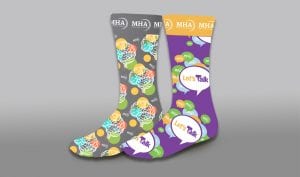SPRINGFIELD — Lenny Underwood, owner of Upscale Socks, is teaming up with the Mental Health Assoc. (MHA) this month with a newly designed line of socks to support mental-health awareness
 “I had noticed photographer Lenny Underwood capturing community events, so I knew who he was,” said Kim Lee, vice president, Resource Development & Branding at MHA. “Then I realized Lenny was involved with community panels that tie in with entrepreneurship. He was speaking regularly to groups of adults and also to students. He impressed me, and when someone impresses me from a distance, I try to make that distance go away. I reached out to see how we could partner.”
“I had noticed photographer Lenny Underwood capturing community events, so I knew who he was,” said Kim Lee, vice president, Resource Development & Branding at MHA. “Then I realized Lenny was involved with community panels that tie in with entrepreneurship. He was speaking regularly to groups of adults and also to students. He impressed me, and when someone impresses me from a distance, I try to make that distance go away. I reached out to see how we could partner.”
Added Underwood, “Kim is an idea person, and I like the out-of-the-box thinking she brings to any discussion. Her approaches to mental-health awareness aren’t typical marketing. She brings a serious subject to light in some really creative ways that I totally embraced. Soon we were talking about how we can be in a relationship for the long term, for Mental Health Awareness Month in May, for MHA’s annual fundraising golf tournament in September, and more. She has large aspirations for mental-health awareness.”
Underwood’s sock enterprise began with a dream.
“One night I had a dream I owned a sock line,” he explained. “It was vivid, and I rarely remember dreams, but that night in 2014, I was clear on it. The next day I told a friend. I’m particular about my socks, so I focused on what I dreamt. I followed the business-building process with Spark Holyoke, and a year later, I launched Upscale Socks as a website. It was quite challenging to find manufacturing and turn designs into actual products. Harry Hill, who created my brand and some designs, helped me put legs on this dream to help make it a reality.”
How did the concept of socks to promote mental-health awareness develop? “Organically,” Underwood recalled. “Initially, Kim and I discussed Mental Health Awareness Month and getting something created for that topic. That morphed into a conversation with MHA funders who wanted to make the socks available for golfers in MHA’s annual golf tournament. We identified people who could wear the socks on social media to promote awareness. I pointed out that fashionable socks are one way to reach out to minority communities. Kim shared with me that a majority of MHA staff members are people of color, and she wanted this effort to reflect people they employ who are so vital to the agency’s work.”
Underwood explained a personal tie-in as well: his family has experienced trauma and grief through the unexpected loss of loved ones due to pneumonia and COVID-19. “Those are traumatic events, and some members of my family may still be dealing with their feelings. Fortunately, I have been able to handle it; I feel healed, in part because I understand the importance of getting help from loved ones. For me, having a relationship with God has been vital. I believe formal counseling also can be a good option.”
Personal experience helped Underwood realize that more people could feel healed if not for a barrier that too often stands in the way: stigma. “I see how stigma relates to getting help — or not getting help — with mental wellness,” he explained. “It has been an issue I have seen and heard in my adulthood. But I’m optimistic when I see people in the public eye tell their story, being honest and vulnerable, because folks look up to others who are open and relatable. It helps to create more of a dialogue. For men of color, I think it provides opportunities for unpacking the ‘man box’ and getting to the root issues because, if those issues go unaddressed, they just grow. If there’s a way for us to make a dent in dispelling myths related to trauma, grief, and counseling, I want to help. Especially in light of how COVID-19 has impacted communities, I want to do something to support mental health.”
Working with Lee’s team at MHA, Underwood channeled his energy and enthusiasm into the design and manufacture of new socks. While May is Mental Health Awareness Month, they will be available throughout the year at www.upscalesocks.com and at www.mhainc.org.
“Things I’m doing with Facebook, grants that I applied for, and now also mental-health awareness, these are opportunities that came by making myself available,” Underwood said. “Those who know me know that I show up and bring my true self. I remain humble no matter what, and I want to remain teachable so I am open to someone younger than I am or someone who has more experience that I have, so I can learn from them. That’s why opportunities like working together with MHA are great. So have opportunities to work with Rays of Hope, Springfield Public Schools, Square One, and Educare Springfield, plus a scholarship to honor my late sister. We created a sock for her with a sun, moon, and stars theme, and over 1,000 pairs of socks have been donated so far.”
Underwood is also working on a children’s book that teaches about entrepreneurship. “The story is related to my dream and written in a way that students in fourth grade through middle school and even high school can relate to. Business words like ‘invest’ and ‘capital’ and ‘entrepreneur’ appear throughout, and there’s a glossary to help students understand the vocabulary. The takeaway is, if you have an idea that’s brewing, it’s something you can achieve if you do the work and are consistent.
“There are resources in the community to help, like SCORE, EforAll, Junior Achievement, and the Small Business Administration,” he went on. “No matter what zip code you live in, there’s money out there, and there’s help. What you need to start is entrepreneurial spirit. When you have that and apply it, then it morphs into other things. That’s where I’m at now, with expanding aspirations for Upscale Socks as I move into year five. A rebranding is in the works, and we want to expand by supplying existing stores at wholesale while continuing to build the website. We’ll see what the future brings. Follow your dream and see where it leads.”



 “I had noticed photographer Lenny Underwood capturing community events, so I knew who he was,” said Kim Lee, vice president, Resource Development & Branding at MHA. “Then I realized Lenny was involved with community panels that tie in with entrepreneurship. He was speaking regularly to groups of adults and also to students. He impressed me, and when someone impresses me from a distance, I try to make that distance go away. I reached out to see how we could partner.”
“I had noticed photographer Lenny Underwood capturing community events, so I knew who he was,” said Kim Lee, vice president, Resource Development & Branding at MHA. “Then I realized Lenny was involved with community panels that tie in with entrepreneurship. He was speaking regularly to groups of adults and also to students. He impressed me, and when someone impresses me from a distance, I try to make that distance go away. I reached out to see how we could partner.” Workplaces that welcome the talents of all people, including people with disabilities, are a critical component in efforts to build an inclusive community and a strong economy. In my role as president and CEO of MHA, I see the impact that doing meaningful work can have on those we serve. Our participants include people with developmental or intellectual disabilities, people dealing with the life-changing effects of a stroke, people struggling with their mental wellness, and those with other disabilities.
Workplaces that welcome the talents of all people, including people with disabilities, are a critical component in efforts to build an inclusive community and a strong economy. In my role as president and CEO of MHA, I see the impact that doing meaningful work can have on those we serve. Our participants include people with developmental or intellectual disabilities, people dealing with the life-changing effects of a stroke, people struggling with their mental wellness, and those with other disabilities.
